#watashi ga kita
Photo
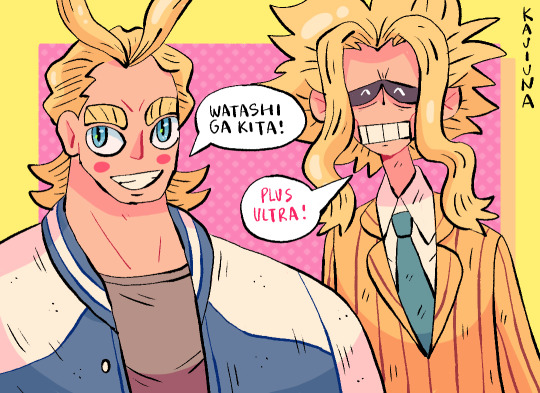
All Might the best <3
#anime#myheroacademia#bokunoheroacademia#myheroacademiafanart#my hero academia#All Might#AllMight#All Might fanart#Watashi ga kita#PlusUltra#Plus Ultra#Animefanart#Anime art#Toshinori Yagi
28 notes
·
View notes
Text
According to Horikoshi, that is based on a game he would play with his mother as a kid
5 notes
·
View notes
Text
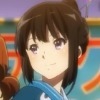
heyo, how's your day everyone? 💕✨
2 notes
·
View notes
Text
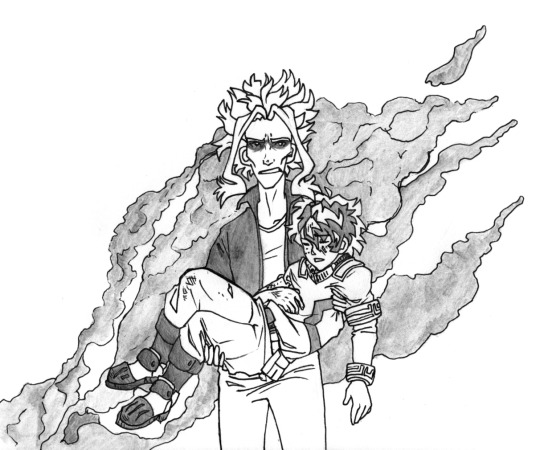
watashi ga kita

#bnha#fanart#bnha fanart#all might#dadmight#toshinori yagi#izuku midoriya#mha#mha fanart#boku no hero academia#my hero academia#mha toshinori#mha izuku#bnha izuku#bnha toshinori#bnha all might#traditional art#dad might
344 notes
·
View notes
Text
MHA Chapter 397 spoilers translations
This week’s initial tentative super rough/literal translations under the cut.
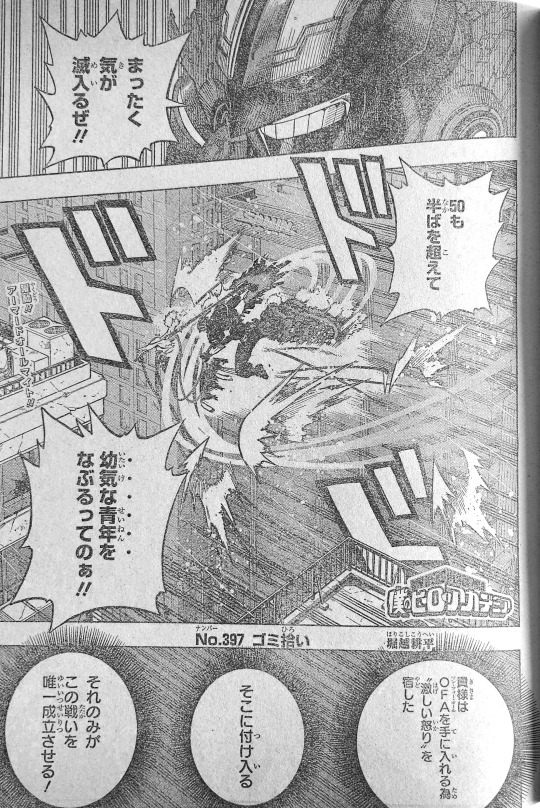
1
まったく気が滅入るぜ‼︎
まったくきがめいるぜ‼︎
mattaku ki ga meiru ze!!
”How absolutely depressing!!"
2
50も半ばを超えて
50もなかばをこえて
50 mo nakaba wo koete
"I'm more than halfway through 50,"
tagline 1
躍動‼︎アーマードオールマイト‼︎
やくどう‼︎アーマードオールマイト‼︎
yakudou!! AAMAADO OORU MAITO!!
Vibrant!! Armored All Might!!
3
幼気な青年をなぶるってのぁ‼︎
いたいけなせいねんをなぶるってのぁ‼︎
itaike na seinen wo naburu tte noa!!
"and I'm tormenting a helpless young man!!"
tagline 2
No.397 ゴミ拾い 堀越耕平
ナンバー397 ゴミひろい ほりこしこうへい
NANBAA 397 GOMI hiroi Horikoshi Kouhei
No. 397 Picking up trash Kouhei Horikoshi
4
貴様はOFAを手に入れる為"激しい怒り"を宿した
きさまはオール・フォー・ワンをてにいれるため"はげしいいかり"をやどした
kisama wa OORU FOO WAN wo te ni ireru tame "hageshii ikari" wo yadoshita
For the sake of getting your hands on One For All, you [chose to] harbor a fierce rage.
5
そこに付け入る
そこにつけいる
soko ni tsukeiru
I'm taking advantage of that.
6
それのみがこの戦いを唯一成立させる!
それのみがこのたたかいをゆいいつせいりつさせる!
sore nomi ga kono tatakai wo yuiitsu seiritsu saseru!
That alone is what makes this battle work!
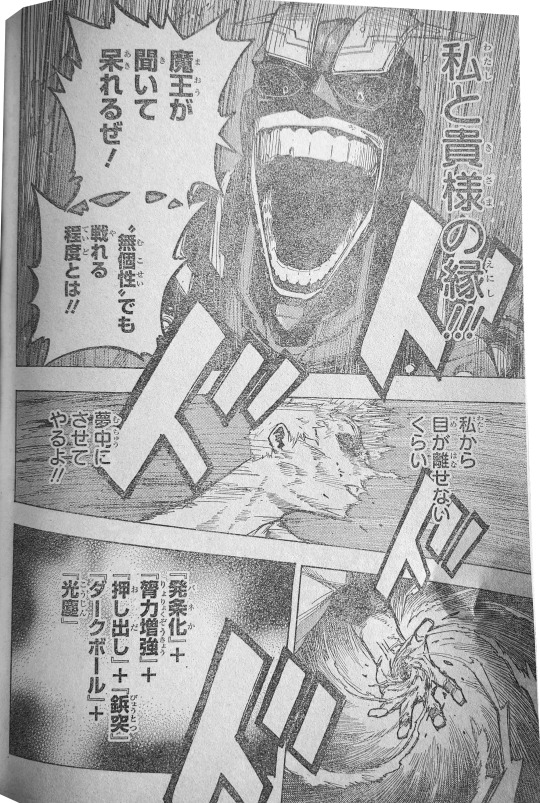
1
私と貴様の縁!!!
わたしときさまのえにし!!!
watashi to kisama no enishi!!!
That connection between you and me!!!
2
魔王が聞いて呆れるぜ!
まおうがきいてあきれるぜ!
maou ga kiite akireru ze!
"The Demon King will be shocked to hear!"
3
"無個性"でも戦れる程度とは‼︎
"むこせい"でもやれるていどとは‼︎
"mukosei" demo yareru teido to wa!!
"The degree to which one can fight even when quirkless!!"
4-5
私から目が離せないくらい夢中にさせてやるよ‼︎
わたしからめがはなせないくらいむちゅうにさせてやるよ‼︎
watashi kara me ga hanasenai kurai muchuu ni sasete yaru yo!!
I'll make you obsessed until you can't take your eyes off me!!
6
「発条化」+「膂力増強」+「押し出し」+「鋲突」 「ダークボール」+「光塵」
「バネか」+「りょりょくぞうきょう」+「おしだし」+「びょうとつ」 「ダークボール」+「こうじん」
「BANE ka」+「ryoryoku zoukyou」+「oshidashi」+「byoutotsu」 「DAAKU BOORU」+「koujin」
Springlike Limbs + Strength Enhancer + Air Cannon + Rivet Stab + Dark Ball + Light Dust
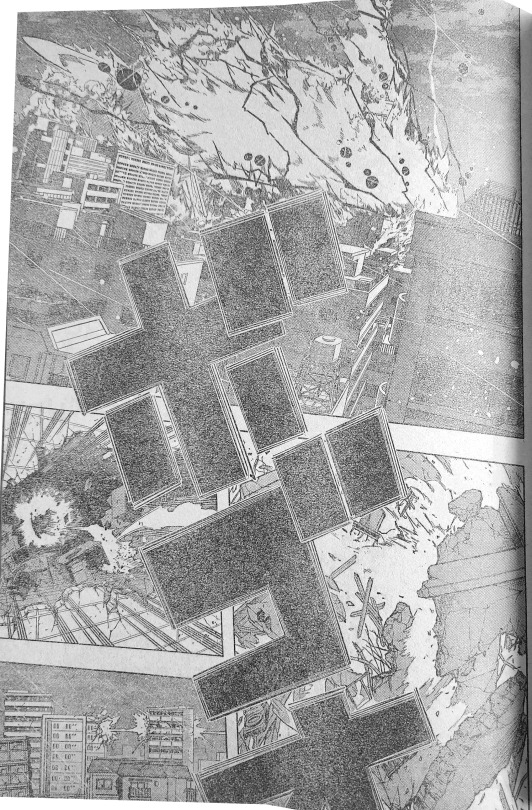
1
ボゴオ
BOGOO
Sound effect: BASH
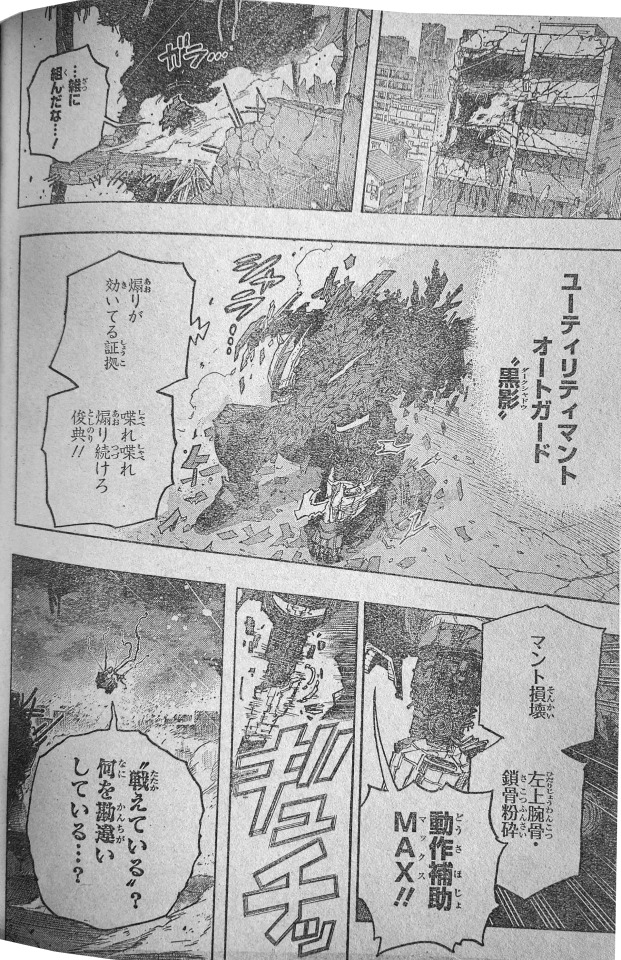
1
…雑に組んだな…!
…ざつにくんだな…!
...zatsu ni kunda na...!
"...So sloppily combined...!"
2
ユーティリティマントオートガード"黒影"
ユーティリティマントオートガード"ダークシャドウ"
YUUTIRITI MANTO OOTO GAADO "DAAKU SHADOU"
Utility Cloak Auto-Guard "Dark Shadow"
3
煽りが効いてる証拠
あおりがきいてるしょうこ
aori ga kiiteru shouko
It's proof my provocations are effective.
4
喋れ喋れ煽り続けろ俊典‼︎
しゃべれしゃべれあおりつづけろとしのり‼︎
shabere shabere aori tsudzukero Toshinori!!
Keep on talking and fanning the flames, Toshinori!!
5
マント損壊
マントそんかい
MANTO sonkai
"Mantle damage:"
6
左上腕骨・鎖骨粉砕
ひだりじょうわんこつ・さこつふんさい
hidarijou wankotsu ・ sakotsu funsai
"Upper-left arm, clavicle smashed."
7
動作補助MAX‼︎
どうさほじょマックス‼︎
dousa hojo MAKKUSU!!
"Operation assistance to max!!"
8
"戦えている"?何を勘違いしている…?
"たたかえている"?なにをかんちがいしている…?
"tatakaete iru"? nani wo kanchigai shite iru...?
"'We're fighting'? What are you misunderstanding...?"
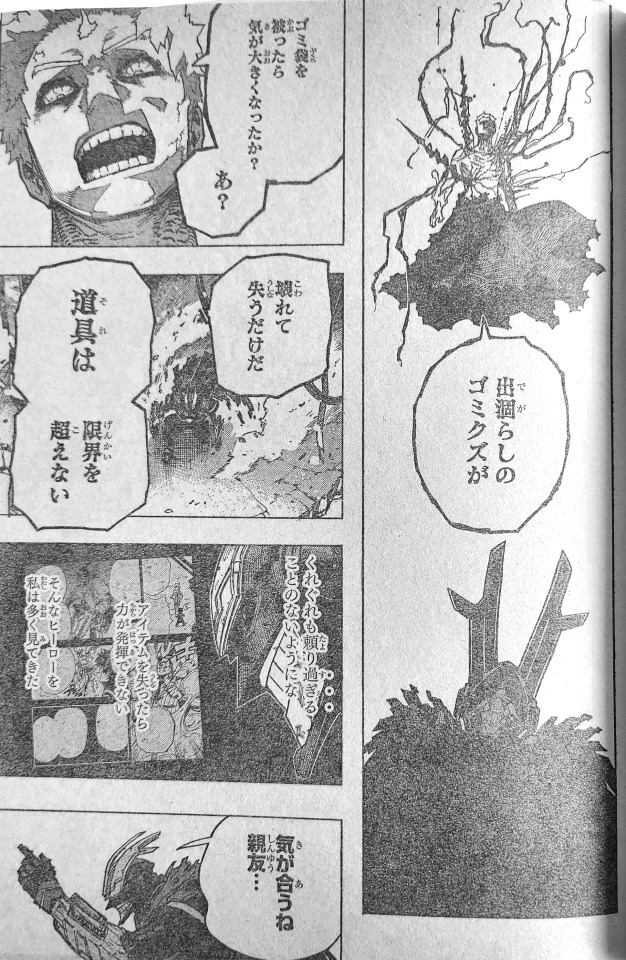
1
出涸らしのゴミクズが
でがらしのゴミクズが
degarashi no GOMIKUZU ga
"You're washed-out garbage."
2
ゴミ袋を被ったら気が大きくなったか?
ゴミぶくろをかぶったらきがおおきくなったか?
GOMI bukuro wo kabuttara ki ga ookiku natta ka?
"When you put on that garbage bag, did it make you feel uninhibited?"
3
あ?
a?
"Huh?"
4
壊れて失うだけだ
こわれてうしなうだけだ
kowarete ushinau dake da
"It'll only break apart and you'll lose it."
5
道具は
それは
sore (kanji: dougu) wa
"That (read as: tool)"
6
限界を超えない
げんかいをこえない
genkai wo koenai
"will not surpass its limits."
7
くれぐれも頼り過ぎることのないようにな
くれぐれもたよりすぎることのないようにな
kuregure mo tayori sugiru koto no nai you ni na
Please don't rely on it too much.
8
アイテムを失ったら力が発揮できない
アイテムをうしなったらちからがはっきできない
AITEMU wo ushinattara chikara ga hakki dekinai
If you lose your item, you won't be able to demonstrate your power.
9
そんなヒーローを私は多く見てきた
そんなヒーローをわたしはおおくみてきた
sonna HIIROO wo watashi wa ooku mite kita
I've seen many heroes like that.
10
気が合うね親友…
きがあうねしんゆう…
ki ga au ne shinyuu...
"We do get along, huh, my close friend..."

1
なん��?少年
なんだ?しょうねん
nanda? shounen
What? Young man,
2
その棒切れ一本で勝つつもりだったのか?
そのぼうきれいっぽんでかつつもりだったのか?
sono boukire ippon de katsu tsumori datta no ka?
were you planning to win with that one stick?
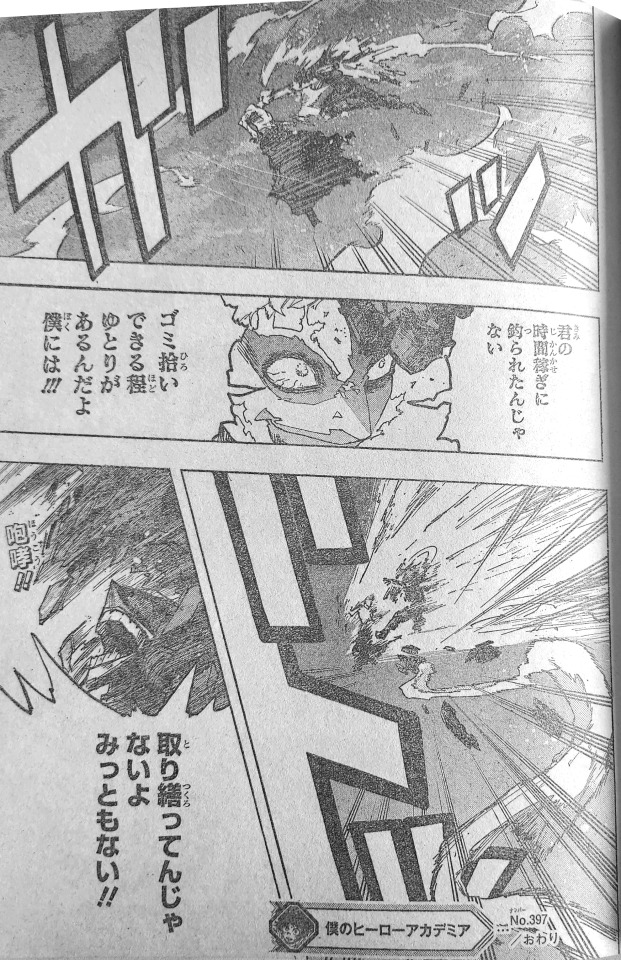
1
君の時間稼ぎに釣られたんじゃない
きみのじかんかせぎにつられたんじゃない
kimi no jikan kasegi ni tsuraretanja nai
"I wasn't lured by you to buy time."
2
ゴミ拾いできる程ゆとりがあるんだよ僕には!!!
ゴミひろいできるほどゆとりがあるんだよぼくには!!!
GOMI hiroi dekiru hodo yutori ga arunda yo boku ni wa!!!
"I have the leeway to be able to take out the trash!!!"
3
取り繕ってんじゃないよみっともない‼︎
とりつくろってんじゃないよみっともない‼︎
toritsukurottenja nai yo mittomonai!!
"You're not keeping up appearances, you're [just] unseemly!!"
tagline
咆哮‼︎
ほうこう‼︎
houkou!!
A roar!!
#my hero academia leak translations#mha 397#bnha 397#my hero academia manga spoilers#final showdown spoilers
94 notes
·
View notes
Text
How the Todorokis call each other (Part 1)
So since I researched for it for my fic here are a bit of the words the Todorokis use to call/talk about themselves and each other in the Japanese manga (occasionally comparing it with the English translation).
Note that I won’t report names that are too general (when one of the children talks of them as his father ('chichi' 父) or his mother ('haha' 母) or when they refers to their family ('kazoku' 家族) and that sometimes, in English, the characters seemed to call someone in a certain way but the same didn’t apply in Japanese.
In order to make things simple I’ll group the characters when a Japanese term is used multiple times, so as to explain what it means only once. In part 2, as well as ending with the list of ways they call each others, I’ll put a summary for each character, so that if you want to know what a specific character use, you can do it more quickly.
Just remember the Todorokis, being a family, tend to use casual speech to talk among them, so they use many words which would be rude if they were to use them with other people but which are perfectly okay between family members. Also in the Japanese family hierarchy, Enji is above his children and wife, Rei is above her children and, in regard to the children, older siblings are above younger siblings.
It's worrth to say I’m not Japanese. The explanations of Japanese terms come from me reading plenty of Japanese dictionaries and grammars but I might have done mistakes or missed something... or missed some way the Todorokis used to refer to each other (as there's actually plenty of quotes). Consider yourself warned and feel welcome to write me if you think I missed something.
HOW DO THEY SAY “I”
Ore (俺/おれ Lit. “Oneself”)
In normal situations all the Todoroki males use ‘ore’.
This term is the most casual form of self-address used by men, which establishes a sense of masculinity. It can be seen as rude, depending on the context, as it’s suitable for conversations among close friends or relatives but not in polite conversation. It emphasizes one’s own status when used with peers and with those who are younger or of lesser status. Among close friends or family, its use conveys familiarity rather than masculinity or superiority. It was used by both genders until the late Edo period and still is in some dialects.
It’s notable how Tōya used ‘ore’ even before Natsuo’s birth so when he was 4 or younger (Natsuo was born after he turned 4). Very likely, despite being so young, he was copying his father’s speech pattern.
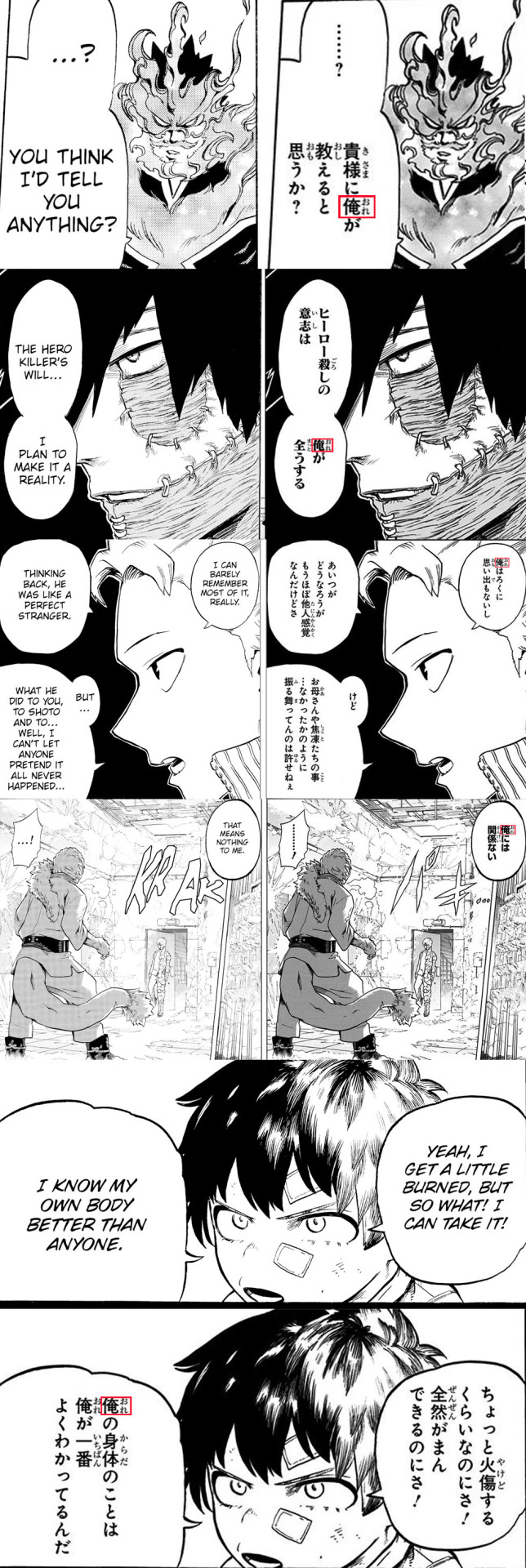
Watashi (私/わたし Lit. “One own person”)
If the male Todorokis use ‘ore’, the female Todorokis use ‘watashi’.
Don’t mistake ‘watashi’ for a female only way to say “I”. Only in casual speech, it is typically only used by women because if used by men in casual context it may be perceived as either stiff or feminine however, in formal or polite contexts, this is gender neutral (for example All Might uses it, his catchphrase “I am here” in Japanese is ‘watashi ga kita’ 私が来た lit. “I have arrived”).
That’s also why in chap 306, when speaking with the press, Enji switches to ‘watashi’ so as to sound as polite/formal as possible (before switching to ‘ore’ again when he tells them to watch him) and, in the anime, they also had him use ‘watashi’ in episode 46 when he answered to the phone so as to convey he was being formal/polite.
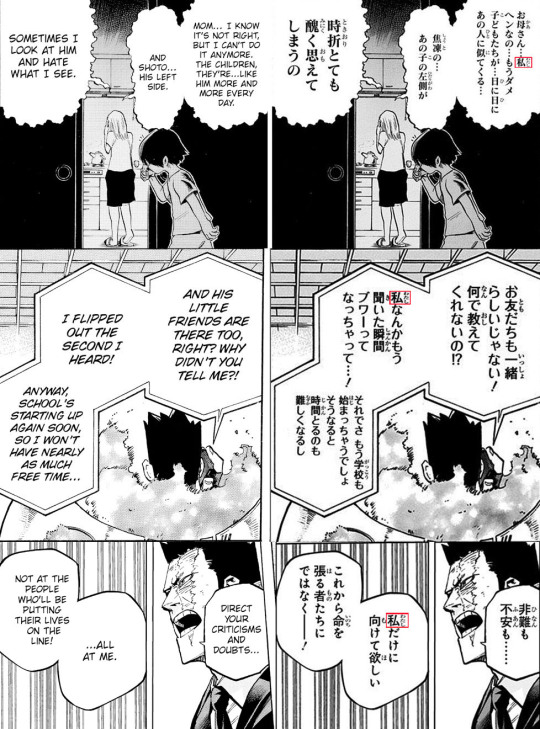
Boku (僕/ぼく Lit. “Servant”)
Used by males of all ages and very often used by boys (for example Midoriya uses ‘boku’ hence the title ‘Boku no Hero Academia’… but All for One also uses it so it’s not just for boys), ‘boku’ is perceived as humble and therefore polite, but can also carry an undertone of feeling young when used by males of older age. In addition to this it’s also used when casually giving deference.
Why I included ‘boku’ in this list if I said all the Todoroki males use ‘ore’?
Well, we actually have some exceptions in which they used ‘boku’.
Differently from Tōya who used ‘ore’ from a very young age, Shōto as a child of 5, used ‘boku’, likely not having the wish to emulate his father’s speech pattern. Interesting enough we know however that Tōya, as an adult, used ‘boku’ when he made his whole speech to the nation which was transmitted during the final stage of the Paranormal Liberation War Arc as, during it, he changed his normally rude speech pattern for one much more polite and humble.
Lastly, although not really a Todoroki but still related to them in a fashion (he’s probably a cousin from Rei’s side since he’s also an Himura), Geten regularly uses ‘boku’.
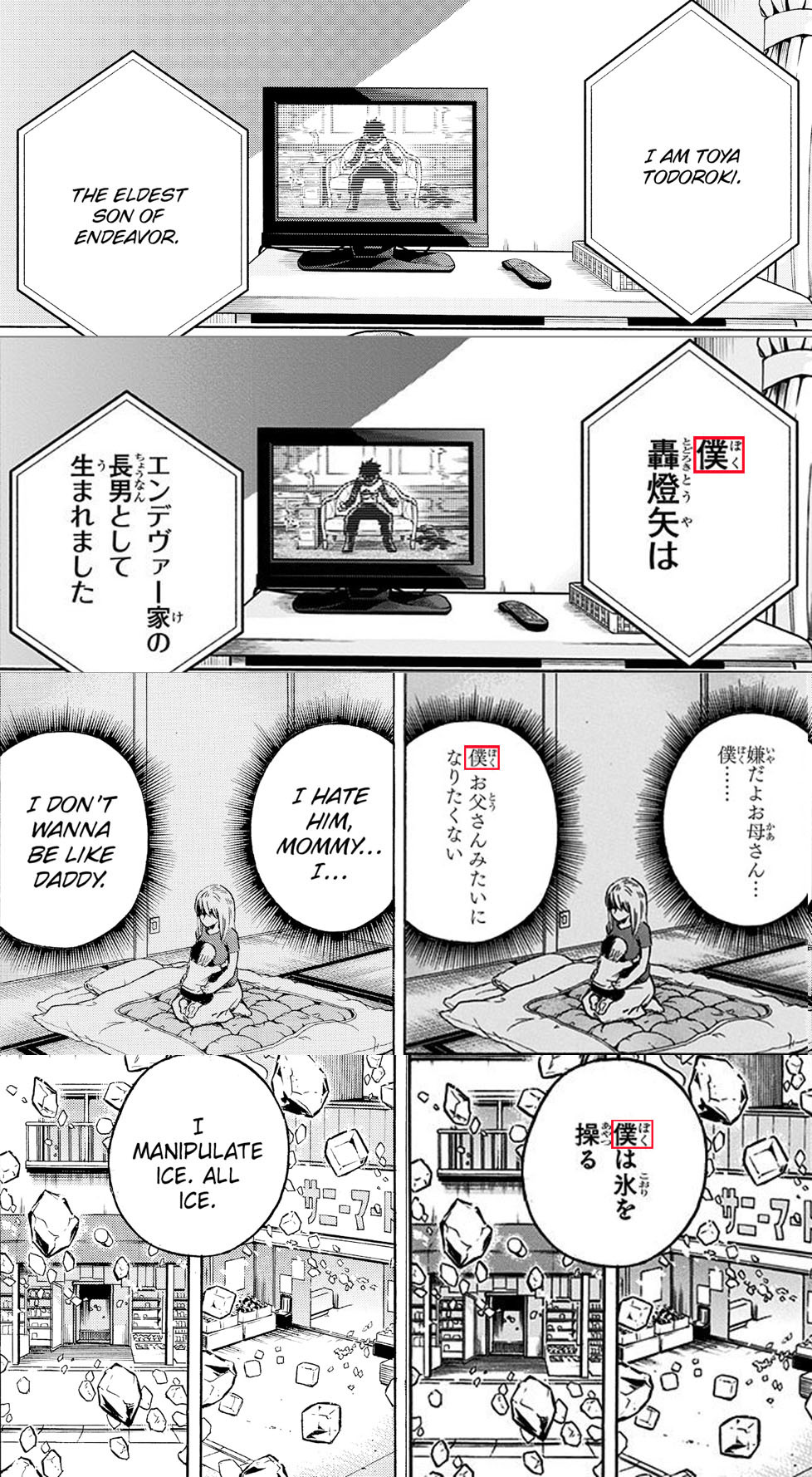
Their own name
Normally used by small children it’s however also a very feminine and kind of childish way to refer to oneself.
Fuyumi, before Natsuo’s birth therefore when she was 3 or younger, used not ‘watashi’ but ‘Fuyumi’ to refer to herself.
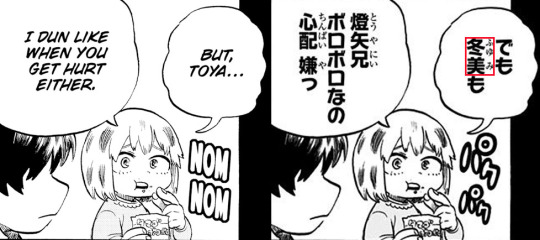
Kono (この “This”) + their own name or personal pronoun
In chap 55 when Enji tells to Gran Torino he will be enough to beat the Nōmu, Enji uses ‘kono Endeavor’ (このエンデヴァー “This Endeavor”). In English this comes out odd and, considering what was said before, you might think it’s either childish or girlish but in this case, with the addition of ‘kono’ the sentence actually remarks the name in a “no one else but Endeavor can do it” way. In the same way in chap 154, when Enji uses this time ‘kono ore’ to tell Hawks if he really believed he was in troubles, it remarks ‘me’ although this time is in the opposite way as to imply “everyone else but him would be in troubles”.
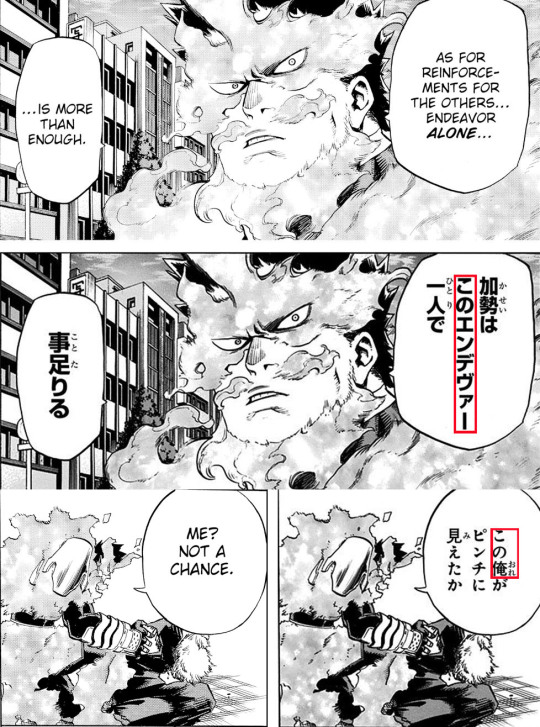
FATHER (父) AND MOTHER (母)
There are various ways in Japanese to say “father” and “mother” that vary for levels of politeness.
Okā-san (お母さん/おかあさん “Mother”)
The addition of the initial ‘o’ (お) and the ‘–san’ (さん) at the end tell us this is a polite way to refer to her, although, since it’s the most common way to call your mother in Japan, even though technically it’s closer to “mother”, it’s perfectly fine to translate it as “mom”, which is currently the most common way to call your mother in English. Note that ‘okā-san’ can also be used to talk about someone else’s mother or for your mother-in-law. Rei is referred as such by all her children, regardless of their age, and even calls herself as such when talking with a young Tōya. Plus this is also how she calls her mother. In the English manga occasionally you also see her called as “mommy” but in Japanese she’s always called ‘okā-san’ only and not in a less formal way (kā-san, okā-chan, kā-chan, mama) and the choice to occasionally translate ‘okā-san’ as “mommy” is likely because the translator felt it would be more fitting for a young child to use it.

Kā-san (お母さん/おかあさん “Mother”)
Same as before but the lack of the initial ‘o’ makes it slightly less polite/formal. It's how Enji calls Rei when talking with Fuyumi.
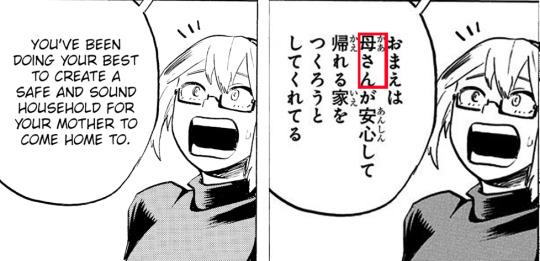
Otō-san (お父さん/おとうさん “Father”)
This is the equivalent to ‘okā-san’ for fathers … but it’s not equally popular as ‘okā-san’ in the Todoroki house. Like ‘okā-san’, 'otō-san' would be closer to "father" but it's okay to translate it "dad" and the English translator occasionally decided to translate it as "daddy" when it was a small child using it. Notably, of all of Enji’s children, only Tōya and Fuyumi still use it, while Shōto, as a child of 5, used it but now doesn’t anymore. Also Rei called Enji as such when talking with a young Tōya.
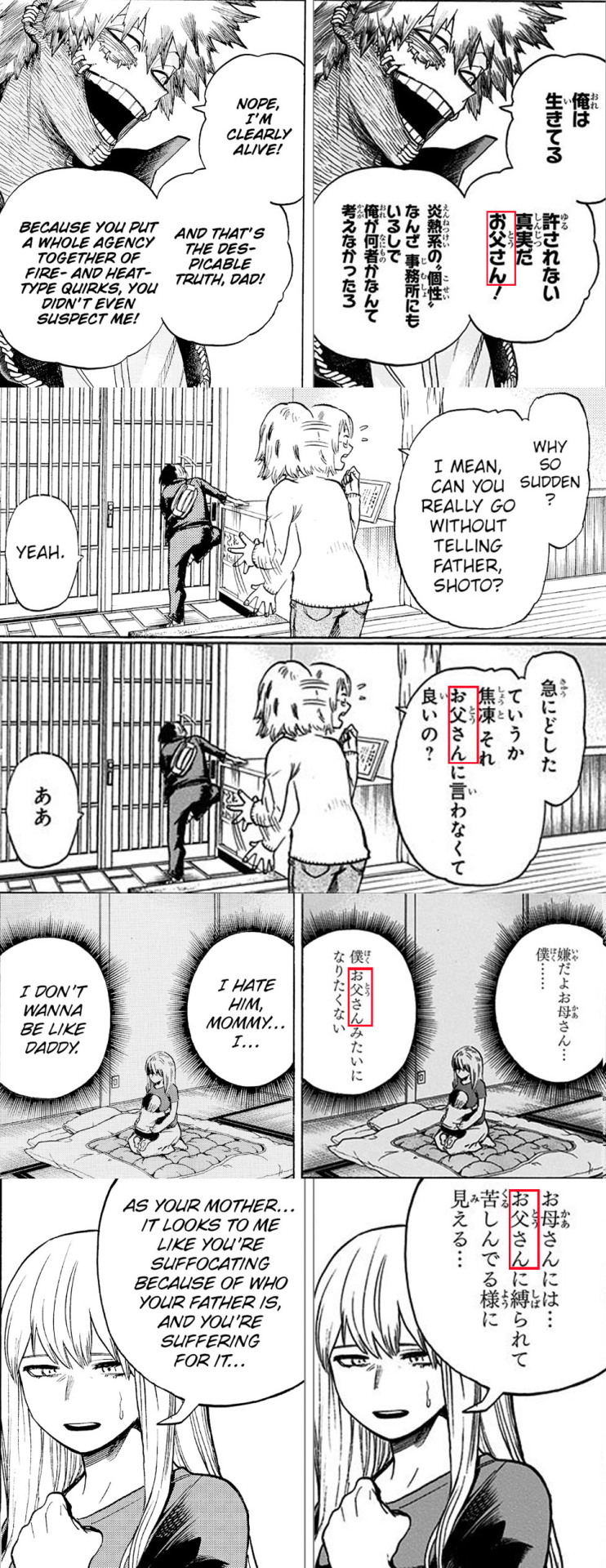
Oyaji (親父/おやじ “Father” or “Old man” lit. “parent father”)
This is a rather nuanced word. Let’s say it’s a more colloquial-sounding way to say “father” which can also used to refer to middle-aged or elderly men. It’s not exactly rude (though some Japanese people consider it as such) but it’s definitely very informal, similar to saying “my old man” in English but (often) without an affection. Again, it's nuanced and depends on the contest. Within one’s own family, teenage and older children, especially males, tend to start using the term to address their fathers at home. In public though, older children will typically call their own fathers ‘otō-san’. Using such word in many cases gives a ‘rough guy’ vibe. Teenager Shōto uses it to talk with or about Enji, regardless he's at home or not, and he’s clearly doing it because he refuse to show him respect, opposite to how he still call Rei ‘Okā-san’ instead than the ‘oyaji’ equivalent, ‘ofukuro’ (お袋). This contrasts sharply with Tōya, who instead regularly uses ‘otō-san’ (though if he does so in a mocking way or as a call back to the past since the past never dies it’s up to speculation) and uses ‘oyaji’ only in a couple of circumstances (chap 301 and 390). In chap 301 he’s clearly trying to keep distance from him as he speaks to himself since he calls him ‘oyaji’ and ‘Todoroki Enji’ instead than his usual ‘otō-san’. In chap 390 he’s being deliberately as rude as possible as he tells him to die. More about it later. It's possible Natsuo would also use 'oyaji' to call Enji, though so far we only saw him either calling him by his Hero name or using 'anta' (あんた) to call him. More about it later.

BIG BROTHER (兄) AND BIG SISTER (姉)
Same as with “father” and “mother” there are various ways in Japanese to say “big brother” and “big sister” that vary for levels of politeness. Note that in theory in a Japanese family the children aren’t all equal but older siblings are hierarchically higher than younger siblings and younger siblings own them respect.
Nē-chan (姉ちゃん)/Nē-san (姉さん)/Onē-chan (お姉ちゃん)
‘Nē’ (姉) is the word used for “big sister”. It can be used alone or after the name of the person in question and the level of politeness changes according to the suffixes and prefixes used. ‘O’ (お “honorable”) gives an extra layer of politeness, '-san' (さん) is your standard polite suffix (when added to a name is generally translated as “Mr.”, “Mrs.”) while –chan (ちゃん) is generally affectionate and expresses closeness and endearment.
Natsuo calls Fuyumi ‘nē-chan’, which is clearly familiar and affectionate, but Shōto calls her ‘nē-san’, therefore sounding more polite and distant. This can reflect the fact that Natsuo grew up closer to Fuyumi and is also closer in age compared to Shōto but might also be a reflection of how they were raised. When Rei told Natsuo to protect his big sister in chap 388, she told him to protect his ‘onē-chan’ (the ‘o’ adds a tone of politeness, but likely Rei always uses it as a way for Rei to remind Natsuo to be polite with his older sister), therefore she might have encouraged him to use a more endearing and close term for his sister, something she might not have done with Shōto merely because he wasn’t allowed to interact with Fuyumi (and the rest of his siblings) when Rei was living with them. In chap 192 Fuyumi calls herself his ‘nē-san’ when talking with Shōto, likely because after Rei left she took up a mother role to him and Shōto might have ended up calling her as such in response. Enji also, when talking with Natsuo, used ‘nē-san’ to talk about Fuyumi and he might have done the same with Shōto so that he ended up doing the same.

Nī (兄)/Nī-chan (兄ちゃん)/Nī-san (兄さん)/Aniki (兄貴)
‘Nī’ (兄) is the word used for “big brother”. The level of politeness changes according to the suffixes and prefixes used, same as ‘Nē’. Now… Tōya is called just ‘Tōya Nī’ by all his siblings and Shōto calls Natsuo ‘Natsu Nī’ as well, no suffixes or prefixes attached. Using just ‘Nī’ it’s very informal and childish but it started likely due to Fuyumi and Tōya being very close in age (11 months of difference) and therefore being allowed to a lower level of formality. Since Shōto was kept apart from his siblings and this lead Rei to stay away from her other children to take care of him as well, Natsuo likely copied Fuyumi’s way to call Tōya and, eventually, Shōto ended up doing the same with both his older brothers despite not being close to them, probably merely because he mimicked the way they talked. Note that when talking to Shōto in chap 34, Enji referred to Tōya as his big brother, he called Tōya his ‘nī-san’. Tōya instead referred to himself as his ‘nī-chan’ twice when talking with Shōto, which could have been mocking but could have also been the way he used to refer to himself with his siblings as a kid. In chap 388 and in chap 244/350 Natsuo and Shōto, when arguing with Tōya drops the childish and familiar ‘nī’, which would be unfitting of the situation, and switch to ‘aniki’ (兄貴). ‘Aniki’ is still a way you can use to call your older brother (‘ani’ is another way to read the kanji for “big brother” (兄) and '-ki' (貴), when added after nouns related to people expresses love and respect) but it’s considered less formal than ‘onī-san’/‘nī-san’, yet not endearing or childish like ‘nī’/‘nī-chan’/‘onī-chan’ as it has a rough note (kind of like ‘oyaji’). It’s notable they don’t use just ‘aniki’ but add a pejorative. Natsuo goes for a ‘KUSO aniki’ (クソ兄貴 “shitty/damn big brother”) while Shōto, who is less close to his big brother, goes for a tamer ‘baka aniki’ (馬鹿兄貴 “stupid older brother”). More about this though, later on.

YOUNGER BROTHERS AND YOUNGER SISTERS
Normally they’re referred just by name, however in Fuyumi and Natsuo’s case they actually have the equivalent of ‘pet names’ of some sort.
Tōya calls Fuyumi ‘Fuyumi-chan’ (冬美ちゃん) and Natsuo ‘Natsu-kun’ (夏くん). As said before ‘-chan’ is generally affectionate and expresses closeness and endearment and, in case it’s attached to the name, is used from older person to younger person. You might want to translate it something like “little Fuyumi” or “dear Fuyumi”. As for Natsuo… ‘-kun’ (君/くん) is usually used for addressing males younger than the speaker. Boys in the same age group can call each other with ‘-kun’ (Midoriya, for example, adds ‘–kun’ to the surname of all his male classmates… while Shōto instead calls them simply by surname). Sometimes male office workers call their younger female colleagues with it. This is not rude but a sign of familiarity. You might want to translate it something like “young Natsu” but just "Natsu" would be fine as well. Interesting enough while Fuyumi calls Natsuo just ‘Natsu’, Rei also calls him ‘Natsu-kun’, Natsuo being the only one among her kids she doesn’t call just with his full name. Shōto is the only one of the younger Todoroki kids who didn't have a suffix attached when called by his older siblings. As said before, being called something different by just your name is not mandatory but it's possible in Shōto's case this is not happening due to him being kept away from them or due to Tōya having been the one who decided the 'pet names' for his younger siblings.
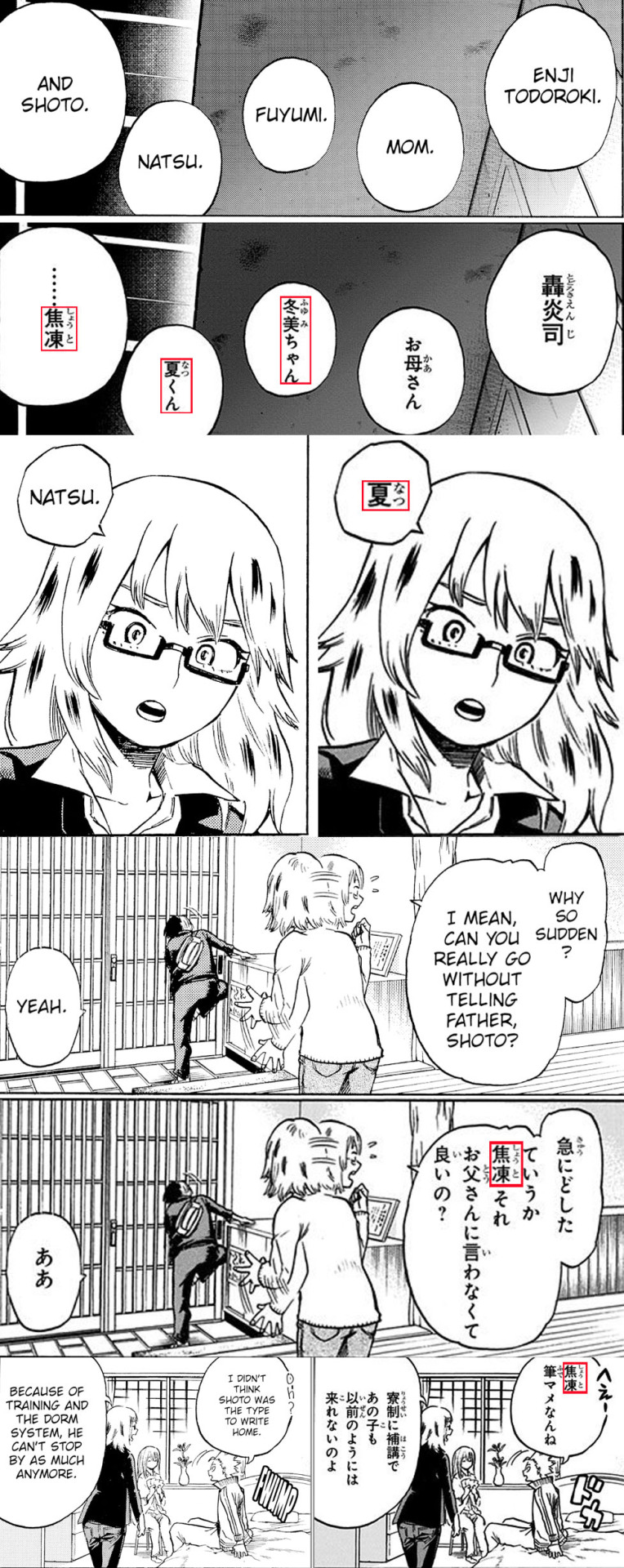
HUSBAND AND WIFE
Again, there are various ways for a husband to call his wife and vice versa.
In Enji’s case though he commonly refers to/calls his wife as just ‘Rei’ and calls her ‘tsuma’ (妻 “wife”) only once, when talking about her and his children in chap 248.
Another common Japanese way to refer to your husband/wife is by calling them "you" (the wife would use ‘anata’ (あなた), the husband would use 'omae' (おまえ)). This often gets translated as "dear" in English manga.
In Rei’s case she usually calls Enji ‘anata’ (あなた), although, for obvious reasons, in the English manga in this case it doesn't get translated as "dear". In Enji's case he occasionally uses 'omae' for her, but since 'Rei' is his default way to call her and 'omae' is his default "you" pronoun for all his family, very likely his 'omae' with her isn't more meaningful than an ordinary "you". More about "you" later on.
Interesting enough in some houses once children are born, the parents start calling each other ‘Otō-san’ and ‘Okā-san’ and when talking with a young Tōya about Enji, Rei called Enji ‘Otō-san’ while Enji, when talking with Fuyumi, calls Rei ‘Kā-san’ but here it was likely done because they were talking with their children about the other parent and not because they are used to call each other in such way.
Interesting enough Nao didn’t use ‘anata’ for her husband but ‘Kotarō-san’.

THE CHILDREN
Enji refers to all his children by first name, while Rei does the same for all her children except Natsuo whom she calls ‘Natsu-kun’.

Both parents, when wanting to talk about their children without saying their name call them either ‘ko’ (子) or ‘kodomo’ (子ども). Both mean child (and can be pluralized) but 'ko’ (子) is a more general term for a child, which is often used in a neutral or formal context (even when the child is actually an adult) while ‘kodomo’ (子ども) is a more specific and inclusive term commonly used to refer to children in a more affectionate or informal way or to emphasize the innocence and vulnerability of children, often used in educational or parenting contexts (and, in the manga, generally used to refer to the Todoroki kids when they were… well, kids). I know I said I wouldn't mention nouns that are too general but, in this case, I’m mentioning all this because, although Enji has no problems in referring to his children as 'ko’ (子) in chap 31, while talking with All Might, Enji referred to Shōto as ‘ko’ (仔) which sounds the same as “child” (子 'ko’) but the kanji he uses is not the usual one for “child” (子) but this one (仔) which means “offspring” and, normally, is used for “young animals/cubs” or “young plants/seedlings”. It’s possible Enji is using it because, when he does, Horikoshi wants us to get the idea Enji is basically talking of how Shōto was breed and raised for the purpose of defeating All Might, as if he were some sort of racehorse, the full sentence being the following:
‘Kore dake oboe toke. ARE ha… izure kisama wo mo koeru HERO ni suru. Sō surubeku… tsukutta ko da’
「これだけ覚えとけ。アレは…いずれ貴様をも越えるヒーローにする。そうするべく………つくった仔だ」
“Just remember this. That one we’re talking about… I’ll make him a hero that will surpass you someday. In order to do that… I had/trained/created that child.”
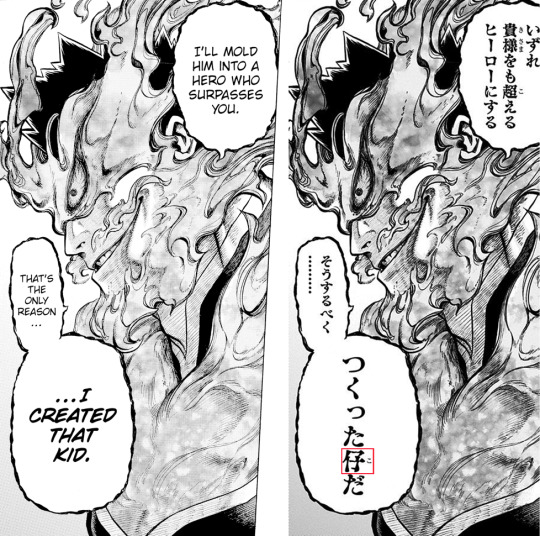
THE GRANPARENTS
In chap 31, when talking about his grandparents Shōto called them ‘haha no shinzoku’ (母の親族 “mother’s relatives”).
'Haha' is the word you use with people outside your group to talk about your mother.
'Shinzoku' (親族) is, under Japanese law, a term that refers to people who we are related to by blood or marriage (you can translate it also as "clan") so yes, it might not necessarily means Rei's parents. It's worth to remember the Himura were an important family with a family head who might not have necessarily be Rei's father (it could have been her grandfather or even her father's male heir), though, due to Geten's story and the scene we saw in chap 301 that in the Himura family the "family head" (当主 ‘tōshu’) was Rei's father.
By the way, the Todorokis instead mention often the 'kazoku' (家族 "family") which is the family unit formed by a married couple and their children.
Shōto might refer in such a formal way to his grandparents either because he's not close to them or because he's talking with Midoriya.
In chap 302 when he refers to his grandparents Tōya called them ‘Obā-chan-tachi’ (おばあちゃん達 “grandma and the others”).
The ‘o’ (お “honorable”) in 'obā-chan' gives an extra layer of politeness while '–chan' (ちゃん) is generally affectionate and expresses closeness and endearment. By using '-chan' and singling out his grandmother (who unlikely was the family head) instead than his grandfather Tōya sounds close to her.
It's possible though his grandfather died when he was younger, hence he referred to his grandmother.
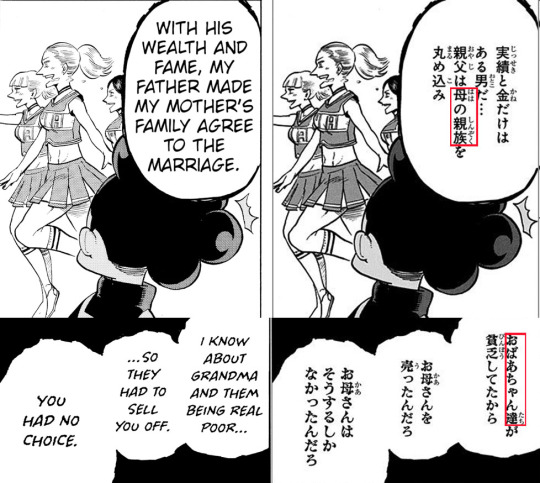
For more about the Himura you might want to read my post about the Himura family.
WHO WORKS FOR THE TODOROKIS
In chap 302 Enji says he’ll hire more ‘shiyōnin’ (使用人 “servant/employee”).
In chap 249 Natsuo calls the person who used to cook for them ‘otetsuta’ (お手伝 “helper/maid”).
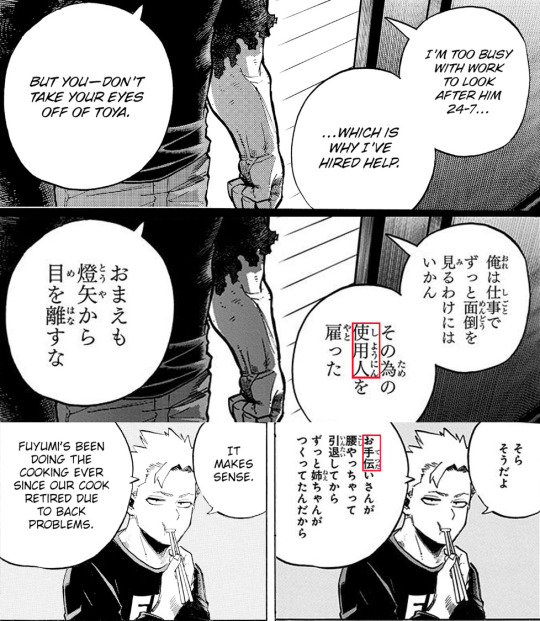
Enji, in his role as Hero, has also an 'untenshu' (運転手 "driver"), Kurumada Untenmaru, but we don't know how Enji or the other Todorokis call him, just that Kurumada calls Enji 'Endeavor' (and 'No.1' in the OAV) and uses 'anta' (あんた) with him (more about 'anta' later on), while he calls 'jarinko' (ジャリンコ) Shōto, Midoriya and Bakugō.
'Jarinko' (ジャリンコ/じゃりんこ/じゃりん子/砂利子) is an old fashioned word used to call a "student who can't keep up in school" but it's also used to say just "brat".

In theory, more than to the Todoroki family, Kurumada is connected to the Hero world, but since, according to his profile, he knows Enji by a looong time (and is one year older than him) I thought to include him as well.
HEROES AND VILLAINS
In Enji, Tōya and Shōto’s case, in addition to their own name they also have their Hero/Villain monikers, 'Endeavor' (エンデヴァー), 'Dabi' (荼毘 "cremation") and 'Shōto' (ショート yes, same as his name but written in katakana instead than kanji)… plus Enji also is defined by his ranking (‘No.2’ first, ‘No.1’ after). In some circumstances the family uses such names instead than the usual way they call them.
Interesting enough though, when Shōto interns under Enji, Enji calls him with his Hero name (which is still 'Shōto' but written in katakana so you can’t really notice it in the anime but it’s visible in the manga) and of course he called Tōya 'Dabi' until he discovered he was his son. After that moment he always called him just Tōya and I couldn’t find an instance in which he called him ‘Dabi’ again.
In fact, even after waking up in the hospital, Enji wants to say Endeavor is dead since he can’t kill a ‘Tairyō satsujin-sha’ (大量殺人者 “mass murderer”) (aka Tōya) but what he voices is instead he can’t kill his ‘musuko’ (むすこ) which means “son” (息子) and, when he finally fights Tōya, he ends up seeing him as the kid he was... making him unable to make a distinction between Tōya and Dabi. Once he acknowledges that Dabi IS indeed Tōya, he won't be able to go back see him as Dabi or call him as such, differently from others of his family members.
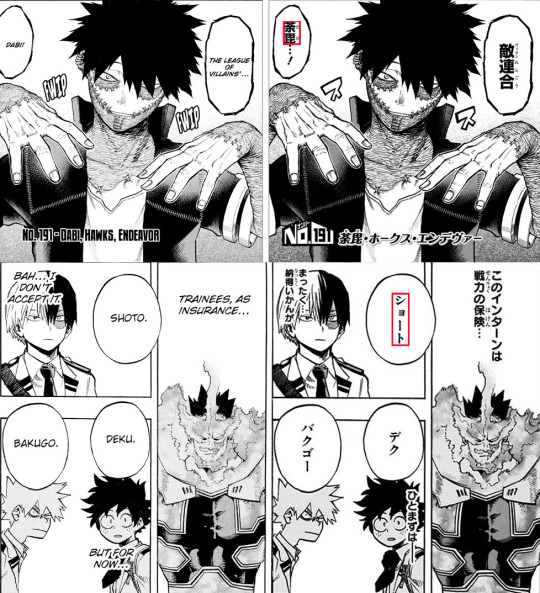
We never see Rei calling Enji 'Endeavor' but we see her calling Tōya 'Dabi' once, when she tells her husband he must fight him (during the rest of the discussion she called him 'Tōya' or 'ano ko' (あの子 “that child”))... as calling him 'Dabi' probably helps her to distance herself from how she's asking Enji to fight their son (Chap 302).

Natsuo called his father 'Endeavor' in chap 249, during the dinner at which Midoriya and Bakugō were invited. This seems to remark his wish not to acknowledge Enji as his father but as a stranger.
Natsuo also refers to his brother as 'Dabi' in chap 302, but more as something that was created more than as his brother, as he's also likely trying to distance himself from the idea Tōya and Dabi are one and the same.
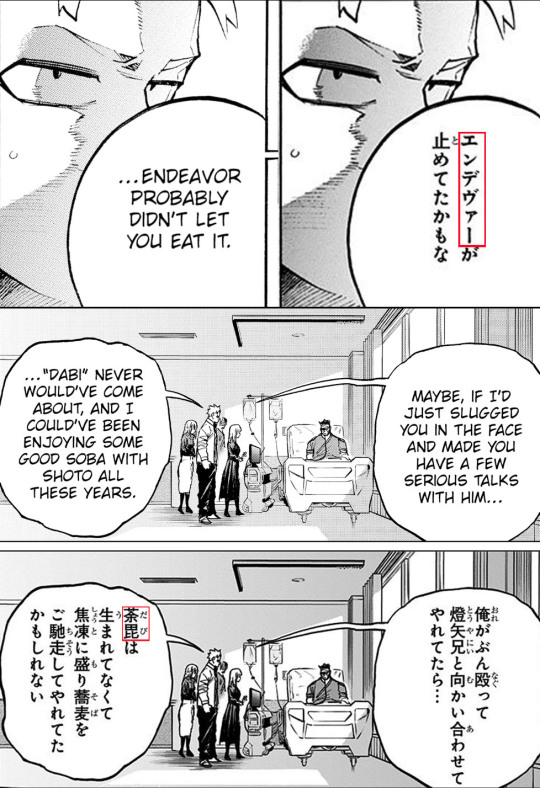
At the same time Shōto called his father 'Endeavor' during the Stain case when asking to other Heroes about him (chap 55) and during his internship (chap 249), in short when he needed to acknowledge him as a Hero.
As for Tōya, of course Shōto called him 'Dabi' before the reveal. After the reveal, in chap 349 Shōto, before fighting Tōya, starts calling his brother just ‘Tōya’ (without the ‘nī’ (兄) which is kind of rude) then decides to switch to ‘Dabi’, either to acknowledge him as a Villain or to keep emotional distance from him. We know also that in the flashback in chap 352 called 'Dabi' his family's sin.

Tōya isn’t really prone to call Enji 'Endeavor' and does so only in few notable situations:
- prior to becoming Dabi, solely when telling Enji to look at him before attacking Shōto as a child (chap 301);
- when facing Enji as Dabi after Enji’s fight with the Nōmu (chap 190);
- when denouncing Enji on tv (Chap 290);
- during the Paranormal Liberation War when he attacked him (chap 292)... although during the battle he alternated calling him 'Endeavor' and 'otō-san';
- when he repeated what Skeptic told him, that Endeavor was at Gunga... but what's meaningful here is that the reading for 'Endeavor' is given as 'otō-san' (chap 374).
This seems to imply Tōya uses 'Endeavor' solely when he's talking to/about/him in his role as a Hero.
On the other side Tōya never calls Shōto with his Hero name… even though, of course, since it matches with his normal name, no one can realize it.
Now... I said the family tries to distance the idea that Tōya IS Dabi by calling him Dabi... but credits when it's due, Tōya himself said that Tōya died and Dabi was born so he too is keeping the two identities parted in a way... albeith he has no problems to refer himself as 'Tōya' and be called as such, both by his family and by Himeko, who switches on calling him from 'Dabi-kun' to 'Tōya-kun', so more than identities, we should probably say he means the person he once was 'died', as he started aiming for different things and behaving differently.

Not quite Todorokis but still related to them, in chap 301 the Himura family head who’s likely Rei’s father, called Enji ‘Endeavor-sama’ (エンデヴァー様) and ‘Top Hero-Sama’ (トップヒーロー様) instead than using his civilian name.
'-sama' (様/さま) is much more formal and polite than just '-san', to the point it’s sometimes translated as “lord”/”lady”.
The fact that the Himura family head is using it underlines how high he thinks of Endeavor, for being such an important Hero.
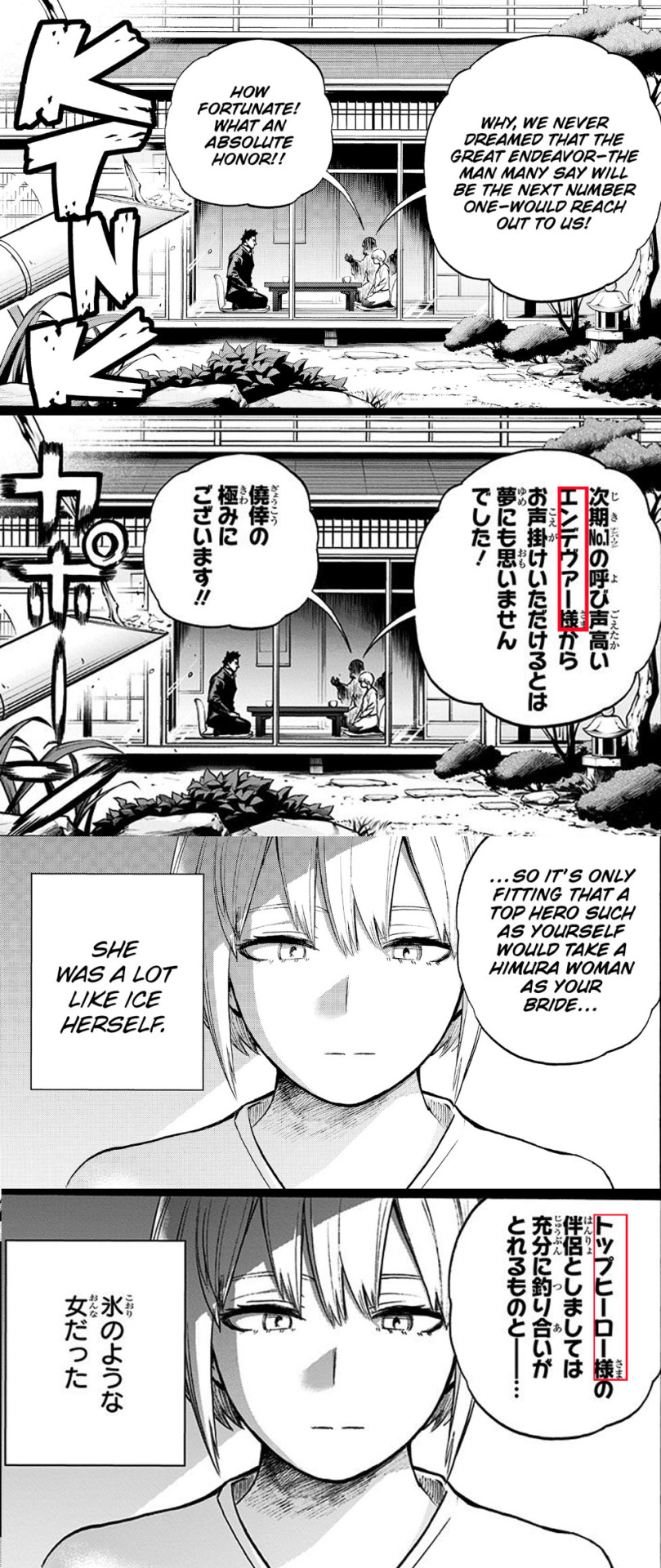
Enji also gets called 'No.2' and then 'No. 1' after he rises to the position. Shōto in chap 31, calls him 'mannen No. 2 no HERO' (万年No.2のヒーロー "eternal No. 2 Hero"). Then after he becomes No.1 Natsuo refers to him as such in chap 192, Shōto does so in chap 247, and Tōya does so in chap 191 and 231. In chap 191 Tōya also called him ‘No. 1 hero-san’ (No.1ヒーローさん), when telling him goodbye and that they’ll have a chance to talk again... though the politeness here is probably an attempt at sarcasm.
In chap 290 Enji himself defined himself ‘kono kuni no Top Hero’ (この国のトップヒーロー “this country Top Hero”).
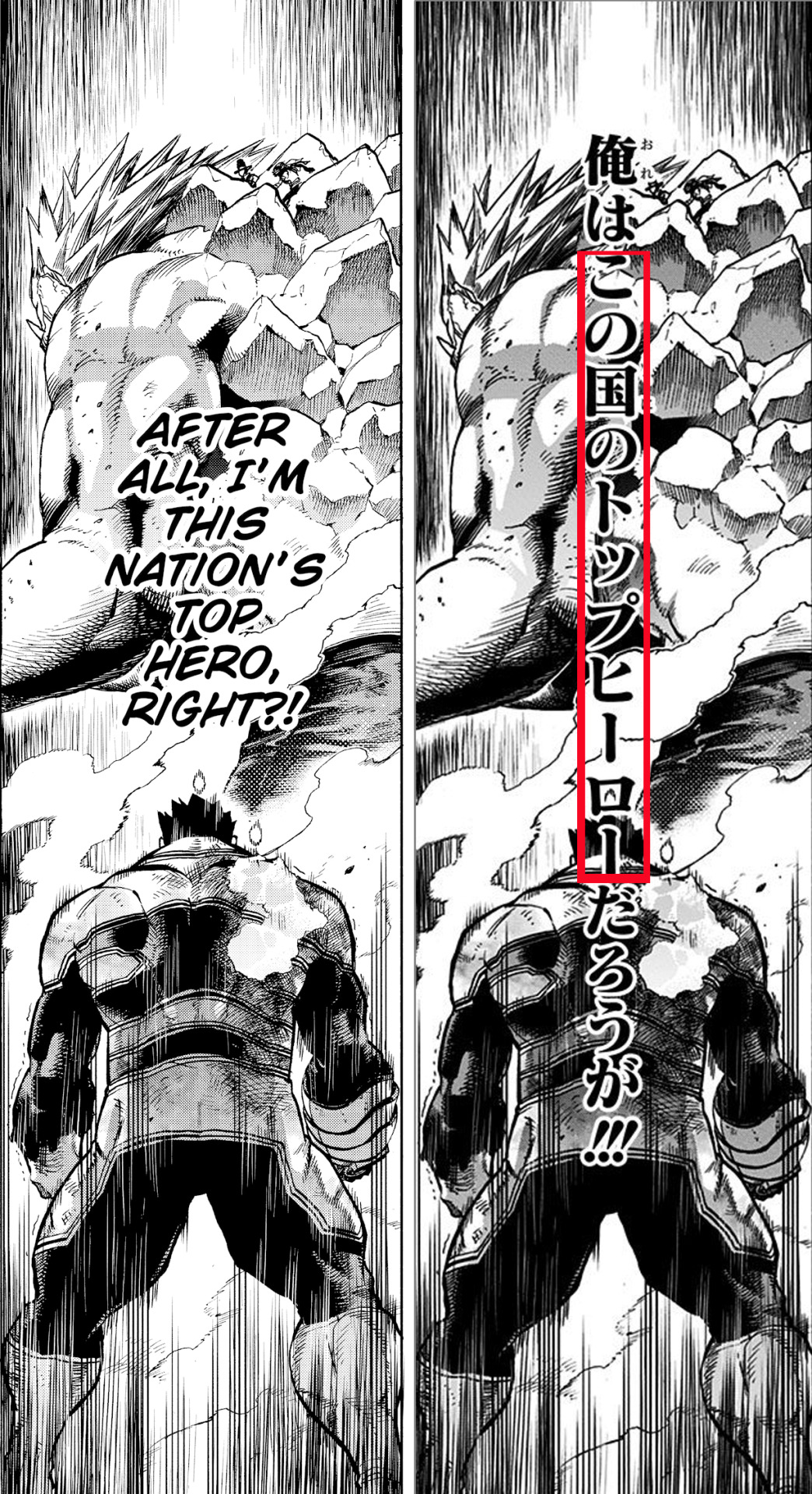
Also I’m placing it here, though I doubt Rei is referring to his Hero role but to how Shōto managed to positively react to all he went through (differently from the rest of the family so he's kind of like a role model to them)… still in chap 302 Rei says Shōto is the ‘Todoroki-ke no HERO’ (轟家のヒーロー “Todoroki’s family Hero”) but the reading given is ‘Uchi no HERO’ (ウチ のヒーロー “our own family’s hero”).
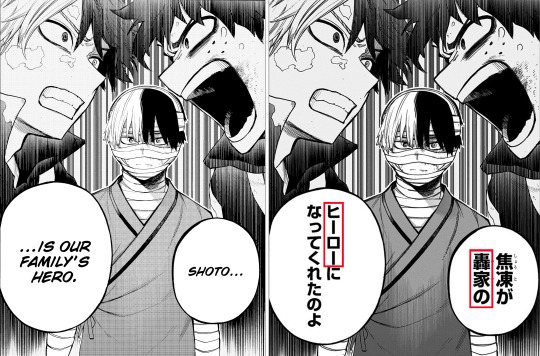
YOU
Polite Japanese speech requires not the use of “you” but the use of a person’s name. However the Todorokis are a family, they talk to each other in an informal way and so they do use also “you” to talk with each other.
Anata (あなた,貴方, 貴男, 貴女 Lit. “precious toward”)
This is the only second person pronoun comparable to English “you”, yet still not used as often in this universal way by native speakers, as it can be considered having a condescending undertone, especially towards superiors. For expressing “you” in formal contexts, using the person’s name with an honorific is more typical (Hawks tends to use 'Endeavor-san' when talking with Enji and switches to 'anata' only when he doesn't want to repeat 'Endeavor-san'.... and while she uses just 'Endeavor' or 'Hawks', when she has to say "you" the Chairman of the Hero Public Safety Committee uses 'anata' as well). More commonly, ‘anata’ may be used when having no information about the addressed person; also often used as “you” in commercials, when not referring to a particular person. Furthermore, commonly used by women to address their husband or lover, in a way roughly equivalent to the English “dear”. Rei uses always ‘anata’ to talk with Enji but, of course, due to their (poor) relation, we never see it as being translated as “dear” in the English manga.
Omae (おまえ/お前/御前 Lit. “polite front”)
This is the “you” everyone in the Todoroki family uses. Of course it comes with a nuance. If used to talk with people outside the family it’s used by men with more frequency and expresses the speaker’s higher status or age, or a very casual relationship among peers. Often used with ‘ore’ it can be very rude if said to elders. Commonly used by men to address their wife or lover, paralleling the female use of ‘anata’. Of course, since the Todorokis are a family, they use it with each other and it’s not meant to be rude (and yes, occasionally Enji used it with Rei though it’s not as recurring as she uses ‘anata’ so it might not have the same nuance)… and since the male Todorokis are rough, tough males who use ‘ore’ they also use it with people that’s outside the family but in this case it’s actually kind of rude (notable how Geten for example uses it with Dabi during their fight).
Anta (あんた/アンタ)
Contraction of ‘anata’ is also generally not used as it’s considered too direct. Can express contempt, anger or familiarity towards a person. Sometimes it can be felt as more rude than ‘omae’ sometimes it’s the opposite. Generally seen as rude or uneducated when used in formal contexts. ‘Anta’ is often used among girls who want to act leading the guy a little bit forcely and scoldishly. There are a bunch of time in which ‘anta’ is used among the Todoroki family members and they’re all when a character is scolding another. We start with Fuyumi who, when scolding Natsuo in chap 187, calls him ‘anta’ (あんた), we continue with Natsuo who, when arguing/scolding Enji in chap 192 and 302 calls him ‘anta’ (あんた) and we finish with Shōto who, when arguing with Enji in chap 351 about who of them has to face Tōya calls him ‘anta’ (アンタ) to tell him he’s the only one who can face All for One. Yes, Shōto uses katakana which generally are used to underline the word, so it's possible it's done to remark how only Enji can do it but also to underline how Shōto, who's angry, is not using his usual ‘TemeE’ (てめエ) with his father but a tamer word. Interesting enough Tōya, or probably I should say in this case Dabi, uses ‘anta’ too, but not with his family member but with Ujiko in chap 350 both to refer just to him and to him and All for One ‘anta-ra’ (あんたら “you” (plural)). Dabi is an ‘omae’ guy who’s generally not polite but calls Ujiko ‘Ujiko-san’, so the fact for him he uses ‘anta’ and not ‘omae’ is probably meant to feel less rude that if he were to use ‘omae’. Another character connected to the Todoroki family who uses ‘anta’ is, as I've already said, Kurumada with Endeavor.
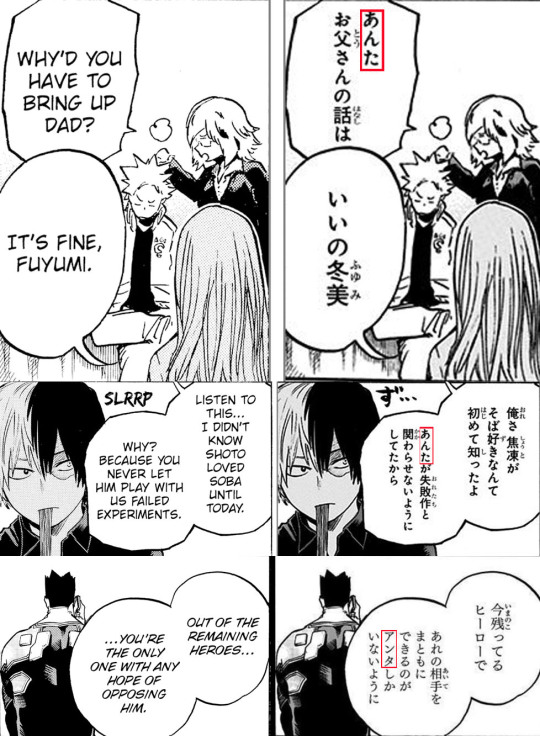
Temē/TemeE (てめえ/てめエ/手前 Lit. “the one in front of my hand”)
'Temē', a reduction of 'temae', is, according to some, the rudest way to say “you” even more rude than ‘Kisama’ (we’ll talk about it in a while) and it’s used when the speaker is very angry. It’s the sort of thing you might translate with “son of a b*tch” or some other insult along the line. Originally used for a humble first person, it’s an ateji, which means either the readings of the individual kanji do not match the reading of the word, or the meanings of the individual kanji do not match the meaning of the word. Shōto uses ‘temeE’ (てめエ) in chap 34 when arguing with Enji (which makes notable how he’ll only use ‘anta’ much later on when arguing with him in chap 351) and again uses ‘temeE’ (てめエ) in chap 292 when fighting with Tōya and Tōya also uses ‘temeE’ (てめエ) in chap 351 when fighting with Shōto (in their previous fight he used ‘omae’ with him). The fact that the last ‘e’ is written in katakana instead than hiragana is often done to put emphasis on it.
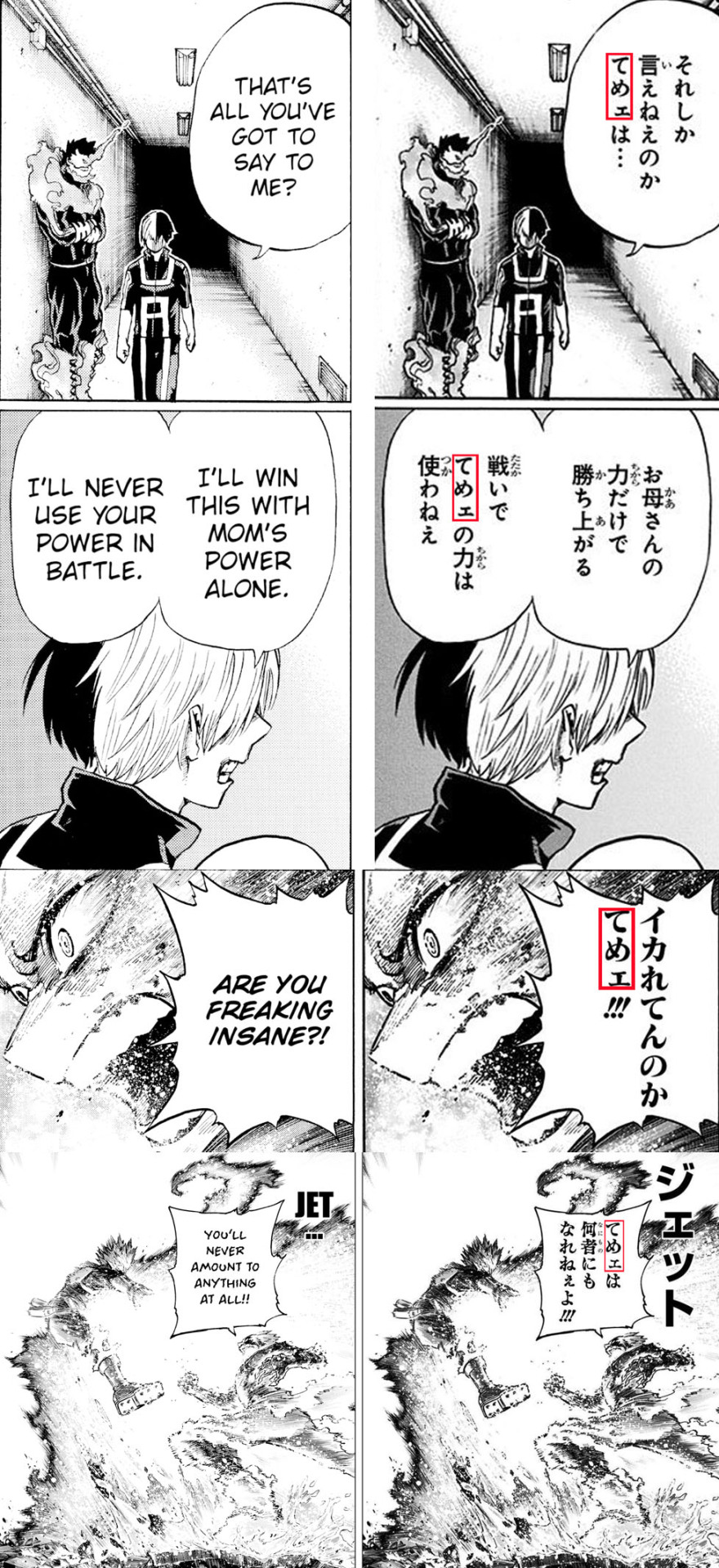
For completeness sake I’ll report two other ways to say ‘you’ which some of the Todorokis use but not, as far as we know, with their family members.
Kimi (君/きみ Lit. “lord” (archaic))
It’s the kanji also used to write '-kun'. Informal to subordinates; can also be affectionate; formerly very polite. Among peers typically used with ‘boku’ (僕) (so, as you can easily guess it’s Midoriya’s “you” when he’s not using someone’s name). Often seen as rude or assuming when used with superiors, elders or strangers. Enji uses it when talking with Midoriya at the sport festival and when he observes how Midoriya too was one of them because he should have suffered for his Quirk, showing him some degree of politeness… but he will eventually switch on using ‘omae’ for him during the Dark Hero arc, which likely his meant to imply they gotten more familiar, not that he's being disrespectful.
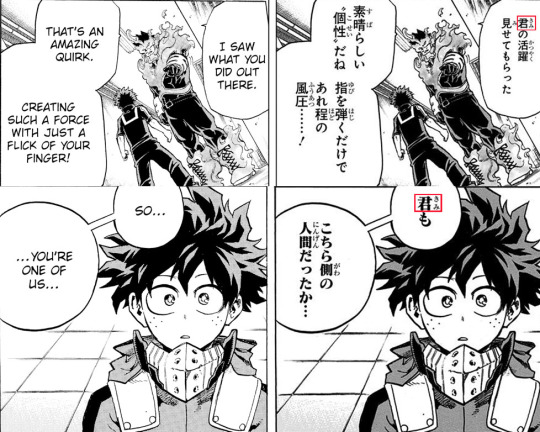
Kisama (貴様/きさま Lit. "precious lord")
Historically very formal, but has developed in an ironic sense to show the speaker’s extreme hostility/outrage towards the addressee. It’s basically so rude/aggressive it often gets translated into “bastard/you bastard”. Enji uses it when talking with All Might, sometimes outright saying ‘kisama’, sometimes the furigana say ‘All Might’ but the kanji below say ‘kisama’ just to drive home the way Enji is saying ‘All Might’ is all but polite and all this is very rude as All Might isn’t just ranked above him but he’s older than him and a Hero by longer time so he definitely deserves more respect. Enji also calls ‘kisama-ra’ (it’s a plural form of ‘kisama’) Midoriya and Bakugō when they intern under him. This is actually interesting. He starts with ‘omae-tachi’ (it’s a plural form of ‘omae’) when he says he’ll supervise them, then switches to ‘kisama-ra’ when he tells Bakugō and Midoriya to tell him about themselves, then he moves to ‘kimi’ when he says since Midoriya too suffered for his Quirk he’s one of them… to go back to ‘kisama’ when he address Bakugō only… to switch again to ‘omae-tachi’ when he’s addressing the three of them… to go back to ‘kisama-ra’ when he tells them they’ve to gain experience working under him and uses ‘kisama-ra’ again when he tells Bakugō and Shōto he’ll give them the same assignment and also uses it to tell the three of them won’t impact on his work. Long story short, very likely that ‘kisama’ is solely meant to remark how they’re working under him. He also uses ‘kisama’ when he begins interacting with Hawks (who instead, as said before, uses 'Endeavor–san' and when he has to use “you” with him goes for ‘anata’ despite Hawks being an ‘ore’ guy), only to switch to ‘omae’ later on.

CONTINUE IN THE NEXT PART!
#boku no hero academia#Todoroki Shouto#Todoroki Touya#Todoroki Enji#Todoroki Natsuo#Todoroki Fuyumi#Todoroki Rei
26 notes
·
View notes
Text

Watashi Ga Kita!!!💛
#Toshinori Yagi#All Might#MHA#MHA fanart#BNHA#BNHA fanart#My Hero Academia#Anime#He has my whole heart#I love his hands in this#Pose for the fans#Best character
26 notes
·
View notes
Note
If I remember correctly, All Might’s “I am here” is just something that can’t be properly conveyed through translation. It is a correct translation, but All Might says his phrase in a very particular way in Japanese. Basically the difference between reporting his arrival vs the significance of it (everything will be alright because he is here).
I know that it's "watashi ga kita!" and looking it up now I see people claiming it's odd but I can't find any description as to what makes it odd
45 notes
·
View notes
Text
I watched Good Omens season 2 in 3 languages...

"And I would like to spend-"
"だからこれからも、" (Dakara kore kara mo-)
"Gusto ko tayong dalawa-"

"That's the point. No nightingales."
"そういうことだよ。ナイチンゲールがいない。" (Sou iu koto da yo. Naichingēru ga inai.)
"Yun nga mismo. Walang nightingales."
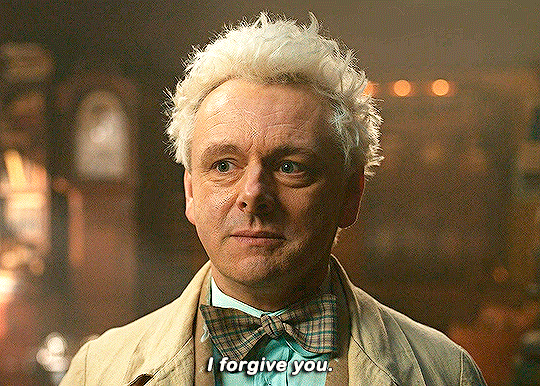
"I forgive you."
"私君を許そう。" (Watashi kimi o yurusou.)
"Pinapatawad kita."
And now... I've experienced heartbreak in 3 languages. Can anybody tell me why am I doing this to myself? 🥹
#good omens season 2 spoilers#good omens 2#good omens#crowley#aziracrow#aziraphale and crowley#aziraphale#go season 2#no nightingales#ineffable divorce#good omens japanese dub#good omens filipino dub
24 notes
·
View notes
Text

Watashi ga kita
23 notes
·
View notes
Text
BUCK-TICK 名も無きわたし (Namonaki watashi) English translation & romaji
"Nameless me"
One drop of rain
Please, just one drop
One drop of love
Please, just one drop
Me, without a name*
Came across you
Even to me, without a name,
Butterflies… wind… and dreams..
Oh you flowers that bloom out of season
Now, bloom in profusion!
Oh living things who bloom out of season
Disarray disarray disarray*
Thank you for love
For days in sunlight
A single flower
A hair ornament for you
Me, without a name
Came to part with you
Even to me, without a name,
Red…and yellow…dreams…
Oh you flowers that bloom out of season
Now, bloom in profusion!
Oh living things who bloom out of season
Disarray disarray disarray
Oh you flowers that bloom out of season
Now, bloom in profusion!
Oh living things who bloom out of season
Disarray disarray disarray
[T/N] 乱れ (midare) means unrest, disorder, disturbance, but also disarray, for now i chose disarray because it sounds the closest to midare, but perhaps i’ll change it
i decided to translate "namonai" as "without a name" for the sake of phonetic continuity, but as an adjective, it also means "unknown", "insignificant", "obscure". literally "na mo nai" means "without even a name", and i feel like it conveys the meaning better, but maybe that's just me
original kanji & romaji under cut!
kanji
一雫 雨を
一雫 ください
一雫 愛を
一雫 ください
名も無い わたしは
あなたと 出会いました
名も無い わたしにも
蝶や 風や 夢が‥
狂い咲く花たちよ
今は咲き乱れよ
狂い咲く命共
乱れ 乱れ 乱れ
ありがとう 愛を
陽だまりの 日々を
一輪の 花を
髪飾り 君に
名も無い わたしに
あなたと お別れ来た
名も無い わたしにも
赤や 黄の 夢が‥
狂い咲く花たちよ
今は咲き乱れよ
狂い咲く命共
乱れ 乱れ 乱れ
狂い咲く花たちよ
今は咲き乱れよ
狂い咲く命共
乱れ 乱れ 乱れ
romaji
hitoshizuku ame wo
hitoshizuku kudasai
hitoshizuku ai wo
hitoshizuku kudasai
namonai watashi wa
anata to deaimashita
namonai watashi ni mo
chō ya kaze ya yume ga
kuruisaku hanatachi yo
ima wa sakimidareyo
kuruisaku inochidomo
midare midare midare
arigatō ai wo
hidamari no hibi wo
ichirin no hana wo
kamikazari kimi ni
namonai watashi ni
anata to owakare kita
namonai watashi ni mo
aka ya ki no yume ga
kuruisaku hanatachi yo
ima wa sakimidareyo
kuruisaku inochidomo
midare midare midare
kuruisaku hanatachi yo
ima wa sakimidareyo
kuruisaku inochidomo
midare midare midare
#buck-tick#izora#namonaki watashi#fish tank#b-t#vkei#buck-tick translation#my translation#romaji#lyrics#song lyrics#atsushi sakurai#buck-tick english#名も無きわたし#異空
42 notes
·
View notes
Text
Anata no kokoro o bakkyunkyun!! Ki ga tsukeba monitaa no mae de ohayo! Shiranai aida ni nemuke arawareta (aauuaauu) Isogashii noni amaenagara yoseru Kotoba ni sasoware "Kimi wa jitsu ni baka da naa" "Honki de tsuraretaa" Kanpeki ni ma ni awanai doushiyou mo nai sono toki Hirameita nanika ni yori sugu ni akirameta~ Baka baka baka Nani ga koko made anata o ugokasu no? (Uugookaasuu noo) Michi naru sekai e tobitatsu Kibou nose Baka baka baka Hoka ni yaru koto madamada arun ja nai? (Taakuusaann noo) Naite waratte okoru koto Makasete ne! Watashi no iro ni shite ageru♪ Kurietibu na kokoro wa orenai sa Sou wa iu keredo sude ni kuzureteta♪ "Oi, sore wa dame daro" Naani mata mochinaosereba hora Yaruki takusan afureru Sunadokei no you ni~ Tekitoo ni tsukuri ageru dakedo nanika mono tarizu Neta o sagashitemita kedo chikara tsukete kita Baka baka baka Machibouke nanoni tenuki toka hidoi yo(hiidoosuugii DAA) Honki daseba shiawase desho? Anata nara Baka baka baka Yarubeki koto wa subete wasurechae(Sutechae yo) Utau odoru egaku kotoba Okuridasu Watashi no tame ni Ok! O o o o O o oo oo O o o o O o oo oo Tetopetesoo Baka baka baka Nani ga koko made anata o ugokasu no? (Uugookaasuu noo) Michi naru sekai e tobitatsu Kibou nose Baka baka baka Hoka ni yaru koto madamada arun ja nai? (Taakuusaann noo) Naite waratte okoru koto Makasete ne! Baka baka baka Machibouke nanoni tenuki toka hidoi yo(hiidoosuugii DAA) Honki daseba shiawase desho? Anata nara Baka baka baka Yarubeki koto wa subete wasurechae(Sutechae yo) Utau odoru egaku kotoba Okuridasu Anata no iro ni shite ageryuuuuuuuuuuu♪
4 notes
·
View notes
Text
Angel's voice chapter 4 | The angel's serenity


They had 3 weeks to prepare for the competition.
In those 3 weeks, venti has been helping (Y/n) get over her stage fright as well as helping her get more confident.
They exchanged numbers and every after their rehearsal, venti would text (Y/n) a small "Great job today! o((^▽^))o " or "You're voice is as beautiful as ever! Keep it up!!! (/≧▽≦)/~" (Y/n) would feel her heart flutter at his adorable messages and would always find herself smiling every time she receives one.
Venti would make (Y/n) sing in front of his friends so that she'd get used to people watching her. Venti was very patient with her and made sure not to trigger anything.
There were times when Y/n would start feeling insecure but Venti was always there to comfort her by playing music. Venti helped her grow and soon, her confidence bloomed, like a flower in spring as he guided her, with a gentle touch, and a listening ear. He helped her find her voice. Their bond grows stronger with each passing day.
And after 3 weeks of hard practice, they were ready.
(Y/n) and Venti were both backstage, waiting for their turn to perform. Y/n took a peek from the curtains and saw the crowd of people and immediately started to get nervous. She closed the curtains back and took a deep sigh trying to calm herself.
Venti took notice of her behavior and placed a comforting hand on her shoulder. "Don't worry, You'll do great! Kazuha's sitting on the front row so don't worry!" his small words of encouragement made her heart flutter as she smiled thankfully at him.
The two were called to the stage as they both walked in front and once again, (Y/n) felt her breath hitch, she could feel it, her anxiety slowly crawling back to her as her hands shook. Kazuha was looking at her with eyes full of worry.
"(Y/n)" She heard Venti softly call her name, she looked at him who was giving her a determined smile. No words were needed to be exchanged, his smile was enough to calm her nerves.
And so the music played as she finally sang in front of a crowd, facing her fears
(Lower your volume again)
ねぇ どっかに置いてきたような事が
Ne~e dokka ni oite kita yōna koto ga
一つ二つ浮いているけど
Hitotsu futatsu uite irukedo
ねぇ ちゃんと拾っておこう
Ne~e chanto hirotte okou
はじけて忘れてしまう前に
Hajikete wasureteshimau mae ni
回り出した あの子と僕の未来が止まり
Mawari dashita ano ko to boku no mirai ga tomari
どっかで またやり直せたら
Dokka de mata yarinaosetara
回り出した あの子と僕が被害者面で
Mawari dashita ano ko to boku ga higaishadzura de
どっかを また練り歩けたらな
Dokka o mata neriaruketara na
とぅるるる とぅるるる とぅるる
とぅるるる とぅるるる とぅるる
とぅるるる とぅるるる とぅるる
とぅるるる とぅるるる とぅるる
To ~urururu to ~urururu to ~ururu
あのね 私あなたに会ったの
Ano ne watashi anata ni atta no
夢の中に置いてきたけどね
Yume no naka ni oite kitakedo ne
ねぇ どうして私が好きなの
Ne~e dōshite watashi ga sukina no
一度しか会ったことがないのにね
Ichido shika atta koto ga nainoni ne
思いを蹴って 二人でしてんだ
Omoi o kette futarideshite nda
壊れない愛を歌う
Kowarenai ai o utau
言葉を二人に課して 誓いをたてんだ
Kotoba o futari ni kashite chikai o tate nda
忘れない愛を歌うようにね
Wasurenai ai o utau yō ni ne
回り出した あの子と僕の未来が止まり
Mawari dashita ano ko to boku no mirai ga tomari
どっかで またやり直せたら
Dokka de mata yarinaosetara
回り出した あの子と僕が被害者面で
Mawari dashita ano ko to boku ga higaishadzura de
どっかを また練り歩けたらな
Dokka o mata neriaruketara na
とぅるるる とぅるるる とぅるる
とぅるるる とぅるるる とぅるる
とぅるるる とぅるるる とぅるる
とぅるるる とぅるるる とぅるる
とぅるるる とぅるるる とぅるる
とぅるるる とぅるるる とぅるる
とぅるるる とぅるるる とぅるる
とぅるるる とぅるるる とぅるる
To ~urururu to ~urururu to ~ururu
回り出した あの子と僕の未来が止まり
Mawari dashita ano ko to boku no mirai ga tomari
どっかで またやり直せたら
Dokka de mata yarinaosetara
回り出した あの子と僕が被害者面で
Mawari dashita ano ko to boku ga higaishadzura de
どっかを また練り歩けたらな
Dokka o mata neriaruketara na
時代に乗って僕たちは
Jidai ni notte bokutachi wa
変わらず愛に生きるだろう
Kawarazu ainiikirudarou
僕らが散って残るのは
Bokura ga chitte nokoru no wa
変わらぬ愛の歌なんだろうな
Kawaranu ai no utana ndarou na
時代に乗って僕たちは
Jidai ni notte bokutachi wa
変わらず愛に生きるだろう
Kawarazu ainiikirudarou
僕らが散って残るのは
Bokura ga chitte nokoru no wa
変わらぬ愛の歌なんだろうな
Kawaranu ai no utana ndarou na
とぅるるる とぅるるる とぅるる
とぅるるる とぅるるる とぅるる
とぅるるる とぅるるる とぅるる
とぅるるる とぅるるる とぅるる
To ~urururu to ~urururu to ~ururu
Their work paid off and they stood together in the spotlight.
Venti could see it, her glowing smile as her eyes shone with happiness and her laughter echoed like a sweet refrain as if the angel finally broke from her chains and spread her wings. And in her freedom, he found his delight.
And he was proud, to see her in her place.
They won 1st place.
Once the two got down, they were greeted by Venti's friends and they congratulated them. Kazuha sprinted towards (Y/n) and gave her a tight hug.
They all went out to celebrate Kazuha was happy to see his cousin like this, she was smiling and laughing with the group as he watched them play games at the arcade they went to with Venti by his side who was also watching (Y/n) interact so happily.
"Thank you venti, and I accept," Kazuha said as he focused on (Y/n) who was laughing as she watched Wanderer and Heizou fight over a cat plush. "huh?" venti tilted his head in confusion.
"You like her don't you?" Kazuha asks teasingly. Venti blushed in embarrassment since Kazuha figured him out already. Kazuha chuckled at his reaction and patted his back "Ask her out, she'll agree I promise" and with that, he also joined the group leaving Venti with his thoughts.
The sun was setting now. Kazuha managed to convince the others to buy some food with him leaving (Y/n) and Venti alone in the quiet park.
"Thank you venti" (Y/n) suddenly said facing Venti who stood beside her and smiled at him. Venti became a bit shy at her words. "I-it's no problem! But uh.. would you maybe wanna go on a date with me as a thank you..?" He muttered with his cheeks tinted pink, he only gets this shy around her.
(Y/n) chuckled at him with her cheeks also turning pink. "Yes, I'd love to"
….
"Hey venti, remember that love song I sang?'
"Yeah, what about it?"
"It was your music sheet from 4 years ago and I added lyrics to it, It was meant to be for you"
"e-eehhhhh?!?!" (o/////o " )
"Hehehe~" ( ˶ˆ꒳ˆ˵ )

Masterlist | Previous chapter
waaahhh I made my first series^^ I'm not too happy with it tbh cause I still think it needs improvement but I'm just proud of myself for creating this. I apologize for the short chapter but I kinda ran out of ideas for the ending T^T. TYSM for reading this short series of mine and I promise to improve my writtings and get better
#venti x reader#genshin x reader#venti x y/n#venti x you#genshin impact x reader#genshin imagines#genshin impact#genshin barbatos#genshin venti
11 notes
·
View notes
Text
KYOU GA SOU INDEPENDENCE DAY YEAH YEAH MUKASHI KARA WANT TO FLY BABY NEMUTTE KITA WATASHI E NO KAKUMEI YEAH YEAH ITSUDEMO CAN DO FLY BABY
3 notes
·
View notes
Text
AI MO KAWARAZU JAMRU MACHI
YAMANU NERVOUS NI SARAWARENAIDE
(HEY)
HIKIKOMORI ZETTAI JASUTISU
ORE NO WATASHI DAKE NO ORI NO NAKA DE
KIKI KOROSHITE RANDEBUU
RE NO WATASHI NO NE GA KIMI NI SOMARU MADE
HIKIKOMORI ZETTAI JASUTISU
ORE NO WATASHI DAKE NO ORI NO NAKA DE
KIKI KOROSHITE RANDEBUU
ORE NO WATASHI NO NE WO KIMI GA TSUTSUMU DAKE
WOWOW TOKI GA KITA IMA
WOWOW EGO HANATE
HAJI WO SUTERARERU KONO BASHO NI KURUIZAKE

#shitpost agenda#shut up richie#project sekai#wonderlands x showtime#i have normal feelings abt them all singing together in the final chorus
3 notes
·
View notes